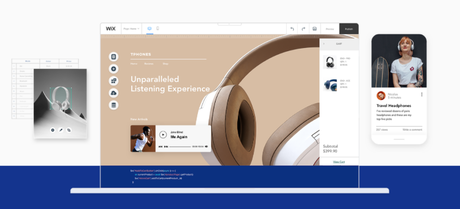If you’re seeking to go online quickly, access our assortment of the best website builder options of 2020.
Website builders have been prevalent for multiple years, but the latest generation now makes wonderful use of current technologies such as responsive and mobile platforms to present an improved service. The finest website builder software permits businesses and individuals to create anything from a one-page site to a professional online store, without the requirement for any HTML of design experience whatsoever.
Whether you’re a multinational corporation or sole trader, nearly every business requires an online presence – in other words, a website. An increasing number are including bells and whistles such as an email list or form facility, domain name registration and plenty more.
While the majority are paid, some free website builders are also available, though tend to possess more restricted functionality than ones built for business use.
Furthermore, website builders are present that serve specifically for photographers, musicians, and online art portfolios.
The following is a rundown of the finest website builder choices presently available.
1. Wix
 Alternatives To WordPress
Alternatives To WordPress
Wix is among the most common online website creators, presenting a variety of plans and products. The free version possesses Wix branding, restricted storage space (500MB) and bandwidth, but shift to the most popular plan (restricted) without any Wix ads. You get unrestricted bandwidth (so its name) and 10GB storage, together with a free domain, GoogleAd vouchers besides much more. The e-commerce plans begin with the “Business Basic” plan with a cost of $17 every month.
A wonderful assortment of 500 plus templates kick-starts the design process off to a rapid start. The drag-and-drop editor offers you all types of tools and features to explore – video backgrounds, an image editor, social buttons, animations, an integrated site blog – and nearly everything can be tuned, tweaked and restyled. Moreover, as of currently, Wix launched Wix Turbo, which raises the speed and performance of websites considerably.
The entire core editing functions are truly smartly designed, and function more like a native app than your average website builder. Wix does have a few weaknesses, with tech support appearing slightly sluggish and restricted in some respects. But there’s no refusing that the superb editor and range of top-quality templates make it simple for web building novices to build something exciting.
Also Read: How To Create A Site To Sell Your Services Online
2. Squarespace
 Alternatives To WordPress
Alternatives To WordPress
A professional website builder with amazing templates.
Another able provider, Squarespace’s website builder presents a plethora of features with a few graceful looking templates. The service is slightly expensive with the cheapest Personal plan costing $12 a month, paid yearly. To be fair, you do obtain plenty of features like unlimited bandwidth and storage, SSL security, SEO features, image and video galleries, intelligent image optimization, performance boosting CDN support, a powerful blogging platform, professional web store, and various others.
Among the initial things that grab your attention are the templates. They are attractively designed and conveniently accessible, as you can shift them at will if you feel later that you don’t like a specific template. The website editor itself is extremely minimalist and sort of bland appearing, but it shouldn’t fool you, as a number of options and features are present here. This is since they are only displayed when you place your mouse cursor over its individual elements.
If you come up with any issues Squarespace provides nice support and their support team is quite well-learned. In addition to their support pages that have FAQs, video tutorials, guides different support like articles, a live chat is also available on workdays from 4am to 8pm EST, and email support is present around the clock.
Also Read: These Websites Will Get You the Best Free Images
3. Weebly
 Alternatives To WordPress
Alternatives To WordPress
Another powerful site builder with a few smart templates and plenty of powerful features is Weebly. Weebly is another famous name in the website building world, which presents a strong editor and able set of features. A free plan also exists, which like Wix restricts space to 500MB and places ads on your site.
Nevertheless, if you shift to the Professional plan – at $12 each month – the ads and storage limit are removed, besides you obtain a free domain, and also support for a web store including nearly 25 products. The supercharged Business plan enables you to build sites with unrestricted web store products and high-end store features such as discount coupons and product reviews, retailing at $25 per month.
The service provides numerous professionally-built web templates, encompassing nearly any type of site. The drag-and-drop editor is cleanly designed, although you don’t receive complete control over where you can place elements on the page, and the interface can appear slightly cluttered. Furthermore, there is no global Undo feature.
Similar to Wix, the tech support was found slightly wobbly in the matter of sluggish responses, but Weebly presents a lot of powerful features, some extremely stylish templates, and easy reach to free images for your site is another certain boon.
Also Read: Advantages Of Building A Website Using WordPress Over Weebly
4. Shopify
 Alternatives To WordPress
Alternatives To WordPress
Shopify is the finest comprehensive ecommerce website builder on the market – it’s intuitive, strong, and loaded with excellent sales tools. Not just that, but you’ll also get access to more than 1200 apps to aid better your online store in all the main areas for selling online. In brief, Shopify is a one-stop ecommerce shop.
In the matter of design, your Shopify store will get accolades. The builder possesses 10 free themes and 50+ paid options, entirely mobile-responsive and built by independent designers. While there isn’t a free plan, Shopify does present a 14 day free trial. Normally, you’ll obtain a more extensive collection of sales tools on the higher price plans.
In the matter of online selling, there are always a few transaction fees to consider. Shopify allows waiver of all transaction fees on their end by using Shopify Payments. This implies that you’ll just pay the standard credit card rate of 2.2% + 20p each transaction on the Basic plan.
However, do observe that you’ll need to pay transaction fees above the credit card fees if you employ an alternative payment gateway, like Stripe or PayPal.
Also Read: Building an eCommerce Website Quickly
5. BigCommerce
 Alternatives To WordPress
Alternatives To WordPress
If you’re seeking to develop an ecommerce empire fast, this is the right platform. We like the sheer quantity of BigCommerce’s top quality in-built features, which can aid your business attain new, dizzying heights. As against Shopify, all you need for developing a business is already there – searching for and installing apps is not required.
Nevertheless, BigCommerce sheds points due to its intuitiveness – or absence thereof. As against Shopify, BigCommerce is difficult to use, and does not contain any mobile app to aid you sell on the go. Nevertheless, following the first initial curve, you’ll discover extreme satisfaction in the powerful tools of the platform. It also presents a 15 day free trial period, and doesn’t levy any transaction charges on any price plans. After the free trial period, you can upgrade to a paid plan, charged in US dollars.
One thing to bear in mind is that you’ll require to upgrade to a higher plan if your annual sales exceed a specific amount. For instance, if you’re undergoing the Standard plan and your annual sales cross $50,000, you’ll need to upgrade to the Plus plan, which has a limit of $150,000. The Pro limit is $400,000, and following this, you’ll need to spend an additional $150 each month for every extra $200K in online sales.
Also Read: Check Out This 5 Step Checklist To Open eCommerce Store
6. 1&1 IONOS
 Alternatives To WordPress
Alternatives To WordPress
There’s plenty to appreciate here in terms of a strong drag-and-drop editor swelling with professional features and greatly customizable templates, though at the outset, let’s make it plain that this isn’t the most inexpensive service around.
No free plan is present (or certainly trial – although there is a 30 day money return guarantee), and the most elementary plan costs $5 a month (first month is free). That offers unrestricted pages and web space, an easy integrated blog, restricted SEO settings, besides website backup and restore, so it’s slightly expensive for what you get.
1&1 IONOS presents an extensive array of responsive templates, and an editor which offers plenty of potential modifications and tweaks, all with lot of visual feedback and context-sensitive menus to aid streamline the entire process. What’s clever here is that the high-level matter is simple to use and comprehend for beginners, yet expert users can dive more deeply into the menus to truly play around and customize elements. You also receive your individual personal consultant free of charge.
Other extremely helpful features contain the ability to direct to your old website in order to import media content from there directly into your latest site. This could be a big timesaver for some. There is also an e-commerce plan beginning at $20 each month.
Conclusion
As you’ve viewed, there are plenty of separate website tools out there. They’ve become quite a dominant force in the website building business. But that doesn’t imply their rivals are essentially worse options. It truly rests on your use case.
Interesting Read:
Create WooCommerce Service Marketplace To Connect Freelancers To Businesses
Keyword Research Tools : Free, Freemium and Paid Options
